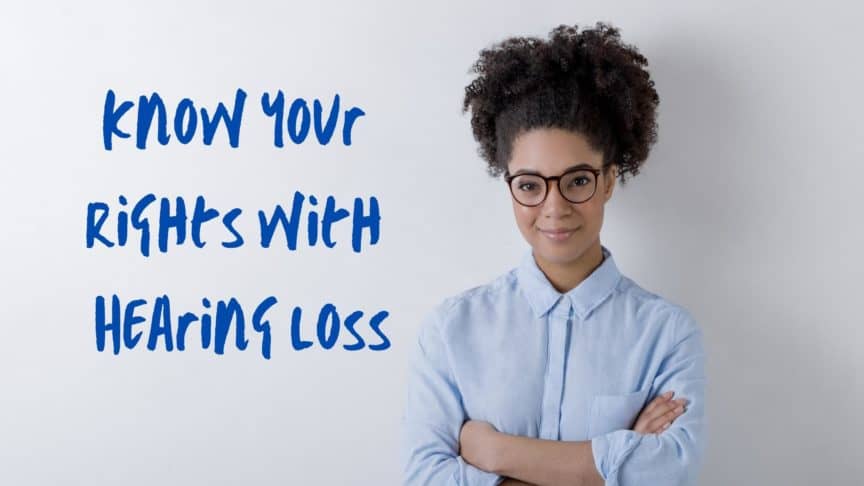- How to Care for Infants With Hearing Loss - April 15, 2024
- Hearing Aid Tips for Runners - April 5, 2024
- Overcoming Misconceptions Around Hearing Aids - March 27, 2024
It can be difficult to live with hearing loss in a world that seems to cater almost solely to the hearing population. Much of the communication between people, in your town city hall or at the bank and other commercial establishments tend to be very verbal. Perhaps you have even spent much of your life communicating verbally, but now have to shift to other venues now that hearing loss has appeared in your life. What exactly are the rights you have, as a person with hearing loss, to demand accommodation for easier communication?
Luckily, due in large part to the labor of activists over many years, the rights of people with hearing loss and other disabilities are protected by laws, both large and sweeping, like the Americans with Disabilities Act (ADA), to lesser known state and local provisions.
The Americans with Disabilities Act was first drafted in 1986 and introduced into the US House of Representatives in 1988. Two long years later, in 1990, President George H.W. Bush signed the bill into law. It was revolutionary in its increased access for people with disabilities. Under this law, people with disabilities — like hearing loss — cannot be discriminated against and it further requires employers and workplaces to provide “reasonable accommodations” and makes accessibility requirements mandatory on public accommodations.
But what does the ADA mean for you, a person with hearing loss?
In the Workplace: Persons with hearing loss cannot be discriminated against in the workplace. Your employer must provide the necessary information so that you can participate in meetings, negotiations and decision-making. For example, if this information is shared with employees verbally, a written copy should be provided for you. If you were to file an ADA-related complaint against your employer, the ADA makes it illegal for them to fire you.
Government Services: You probably use the local library, schools, hospital or courts at least infrequently if not much more often. Under the ADA, government services are required to communicate effectively with you in ways that are reasonable for a person with hearing loss. This ensures that the information the local school, for instance, is providing to the public will be tailored to be delivered to you in an effective manner. A public school board meeting would need to provide an assistive listening device or other means of hearing loss-friendly communication in order for you to attend as a member of the community.
Business/Commercial Establishments: Even commercial establishments in which you are a customer with hearing loss are mandated to provide access under the ADA. You must be able to participate in the business’s offerings in a way that works for you. This means that in visiting a movie theater, you can request closed captioning hearing devices. Or, when visiting a hotel, you will be provided with a non-sound-based alarm system in case of an emergency.
Telecommunications access: Not everyone has a hearing aid with bluetooth connectivity for easy phone calls with loved ones. Without the ADA, the cost of simple telecommunications for people with hearing loss could be astronomical. Instead, the ADA means that if requested, you must be provided with a TTY phone or video relay service so that you can plug into the already existing extensive telephone networks.
Interacting with law enforcement
In addition to these now standard accommodations for people across the disability spectrum, including hearing loss, you might wonder how public services accommodate those hard of hearing. It is a sad fact that a number of people with deafness or hearing loss are harmed, and even killed, by police officers every year. What appears to officers as non-compliance is simply a matter of obstacles in officer’s communication.
Though the burden of effective communication and fair access is squarely on the shoulders of the police, per the ADA, there are steps you can take in your own community. Your local police department may already have a relationship with the deaf and hard-of-hearing community. Be in touch to see if there is a card or pamphlet you can provide officers in the case of personal interaction. These cards let law enforcement know that you have hearing loss and that you will need additional accommodation.

